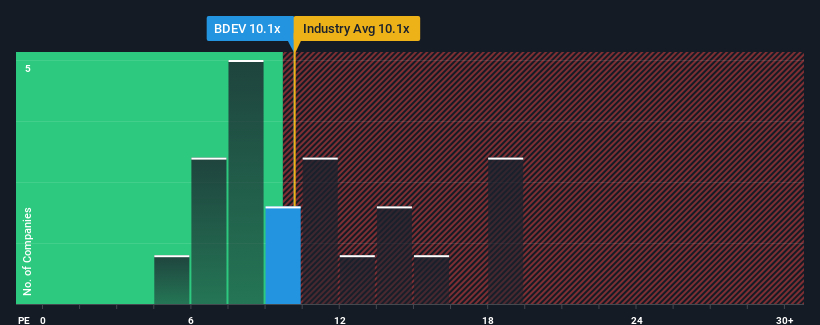- United Kingdom
- /
- Consumer Durables
- /
- LSE:BTRW
Barratt Developments plc's (LON:BDEV) Share Price Is Matching Sentiment Around Its Earnings

Barratt Developments plc's (LON:BDEV) price-to-earnings (or "P/E") ratio of 10.1x might make it look like a buy right now compared to the market in the United Kingdom, where around half of the companies have P/E ratios above 16x and even P/E's above 29x are quite common. However, the P/E might be low for a reason and it requires further investigation to determine if it's justified.
Recent times have been pleasing for Barratt Developments as its earnings have risen in spite of the market's earnings going into reverse. One possibility is that the P/E is low because investors think the company's earnings are going to fall away like everyone else's soon. If you like the company, you'd be hoping this isn't the case so that you could potentially pick up some stock while it's out of favour.
See our latest analysis for Barratt Developments

Is There Any Growth For Barratt Developments?
In order to justify its P/E ratio, Barratt Developments would need to produce sluggish growth that's trailing the market.
Taking a look back first, we see that the company managed to grow earnings per share by a handy 5.3% last year. Pleasingly, EPS has also lifted 39% in aggregate from three years ago, partly thanks to the last 12 months of growth. Therefore, it's fair to say the earnings growth recently has been superb for the company.
Shifting to the future, estimates from the analysts covering the company suggest earnings growth is heading into negative territory, declining 8.0% each year over the next three years. Meanwhile, the broader market is forecast to expand by 12% per year, which paints a poor picture.
In light of this, it's understandable that Barratt Developments' P/E would sit below the majority of other companies. However, shrinking earnings are unlikely to lead to a stable P/E over the longer term. There's potential for the P/E to fall to even lower levels if the company doesn't improve its profitability.
The Key Takeaway
While the price-to-earnings ratio shouldn't be the defining factor in whether you buy a stock or not, it's quite a capable barometer of earnings expectations.
As we suspected, our examination of Barratt Developments' analyst forecasts revealed that its outlook for shrinking earnings is contributing to its low P/E. Right now shareholders are accepting the low P/E as they concede future earnings probably won't provide any pleasant surprises. It's hard to see the share price rising strongly in the near future under these circumstances.
You should always think about risks. Case in point, we've spotted 2 warning signs for Barratt Developments you should be aware of, and 1 of them is potentially serious.
It's important to make sure you look for a great company, not just the first idea you come across. So take a peek at this free list of interesting companies with strong recent earnings growth (and a low P/E).
Valuation is complex, but we're here to simplify it.
Discover if Barratt Redrow might be undervalued or overvalued with our detailed analysis, featuring fair value estimates, potential risks, dividends, insider trades, and its financial condition.
Access Free AnalysisHave feedback on this article? Concerned about the content? Get in touch with us directly. Alternatively, email editorial-team (at) simplywallst.com.
This article by Simply Wall St is general in nature. We provide commentary based on historical data and analyst forecasts only using an unbiased methodology and our articles are not intended to be financial advice. It does not constitute a recommendation to buy or sell any stock, and does not take account of your objectives, or your financial situation. We aim to bring you long-term focused analysis driven by fundamental data. Note that our analysis may not factor in the latest price-sensitive company announcements or qualitative material. Simply Wall St has no position in any stocks mentioned.
About LSE:BTRW
Barratt Redrow
Engages in the housebuilding business in the United Kingdom.
Flawless balance sheet with reasonable growth potential.


